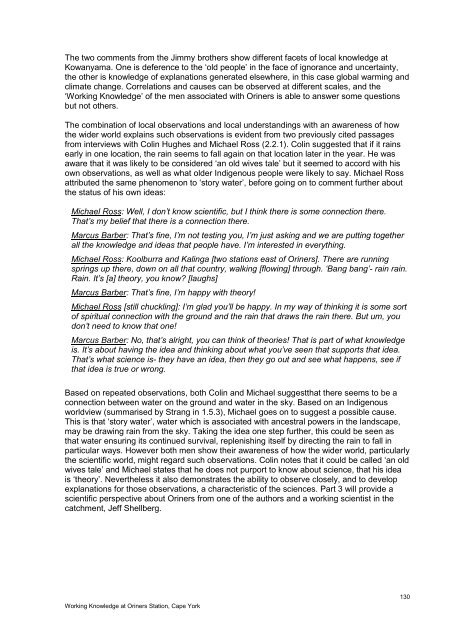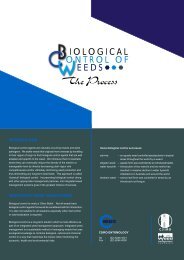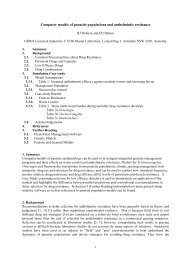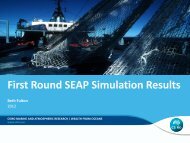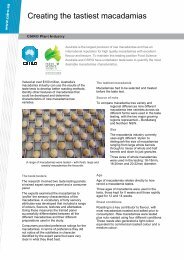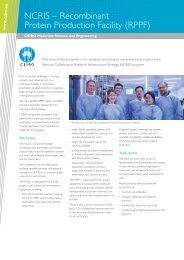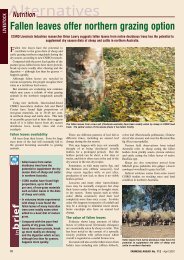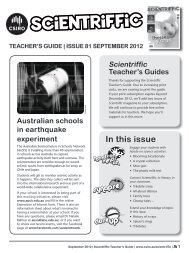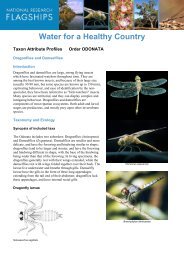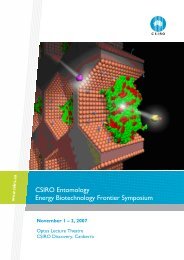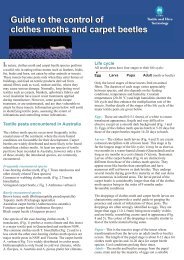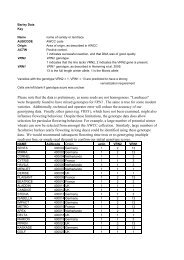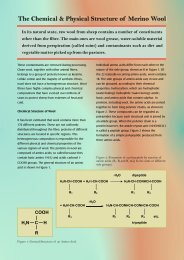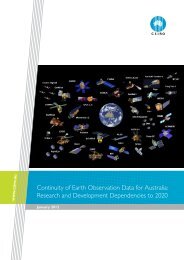WfHC - cover page (not to be used with pre-printed report ... - CSIRO
WfHC - cover page (not to be used with pre-printed report ... - CSIRO
WfHC - cover page (not to be used with pre-printed report ... - CSIRO
You also want an ePaper? Increase the reach of your titles
YUMPU automatically turns print PDFs into web optimized ePapers that Google loves.
The two comments from the Jimmy brothers show different facets of local knowledge at<br />
Kowanyama. One is deference <strong>to</strong> the „old people‟ in the face of ignorance and uncertainty,<br />
the other is knowledge of explanations generated elsewhere, in this case global warming and<br />
climate change. Correlations and causes can <strong>be</strong> observed at different scales, and the<br />
„Working Knowledge‟ of the men associated <strong>with</strong> Oriners is able <strong>to</strong> answer some questions<br />
but <strong>not</strong> others.<br />
The combination of local observations and local understandings <strong>with</strong> an awareness of how<br />
the wider world explains such observations is evident from two <strong>pre</strong>viously cited passages<br />
from interviews <strong>with</strong> Colin Hughes and Michael Ross (2.2.1). Colin suggested that if it rains<br />
early in one location, the rain seems <strong>to</strong> fall again on that location later in the year. He was<br />
aware that it was likely <strong>to</strong> <strong>be</strong> considered „an old wives tale‟ but it seemed <strong>to</strong> accord <strong>with</strong> his<br />
own observations, as well as what older Indigenous people were likely <strong>to</strong> say. Michael Ross<br />
attributed the same phenomenon <strong>to</strong> „s<strong>to</strong>ry water‟, <strong>be</strong>fore going on <strong>to</strong> comment further about<br />
the status of his own ideas:<br />
Michael Ross: Well, I don‟t know scientific, but I think there is some connection there.<br />
That‟s my <strong>be</strong>lief that there is a connection there.<br />
Marcus Bar<strong>be</strong>r: That‟s fine, I‟m <strong>not</strong> testing you, I‟m just asking and we are putting <strong>to</strong>gether<br />
all the knowledge and ideas that people have. I‟m interested in everything.<br />
Michael Ross: Koolburra and Kalinga [two stations east of Oriners]. There are running<br />
springs up there, down on all that country, walking [flowing] through. „Bang bang‟- rain rain.<br />
Rain. It‟s [a] theory, you know? [laughs]<br />
Marcus Bar<strong>be</strong>r: That‟s fine, I‟m happy <strong>with</strong> theory!<br />
Michael Ross [still chuckling]: I‟m glad you‟ll <strong>be</strong> happy. In my way of thinking it is some sort<br />
of spiritual connection <strong>with</strong> the ground and the rain that draws the rain there. But um, you<br />
don‟t need <strong>to</strong> know that one!<br />
Marcus Bar<strong>be</strong>r: No, that‟s alright, you can think of theories! That is part of what knowledge<br />
is. It‟s about having the idea and thinking about what you‟ve seen that supports that idea.<br />
That‟s what science is- they have an idea, then they go out and see what happens, see if<br />
that idea is true or wrong.<br />
Based on repeated observations, both Colin and Michael suggestthat there seems <strong>to</strong> <strong>be</strong> a<br />
connection <strong>be</strong>tween water on the ground and water in the sky. Based on an Indigenous<br />
worldview (summarised by Strang in 1.5.3), Michael goes on <strong>to</strong> suggest a possible cause.<br />
This is that „s<strong>to</strong>ry water‟, water which is associated <strong>with</strong> ancestral powers in the landscape,<br />
may <strong>be</strong> drawing rain from the sky. Taking the idea one step further, this could <strong>be</strong> seen as<br />
that water ensuring its continued survival, replenishing itself by directing the rain <strong>to</strong> fall in<br />
particular ways. However both men show their awareness of how the wider world, particularly<br />
the scientific world, might regard such observations. Colin <strong>not</strong>es that it could <strong>be</strong> called „an old<br />
wives tale‟ and Michael states that he does <strong>not</strong> purport <strong>to</strong> know about science, that his idea<br />
is „theory‟. Nevertheless it also demonstrates the ability <strong>to</strong> observe closely, and <strong>to</strong> develop<br />
explanations for those observations, a characteristic of the sciences. Part 3 will provide a<br />
scientific perspective about Oriners from one of the authors and a working scientist in the<br />
catchment, Jeff Shell<strong>be</strong>rg.<br />
Working Knowledge at Oriners Station, Cape York<br />
130


